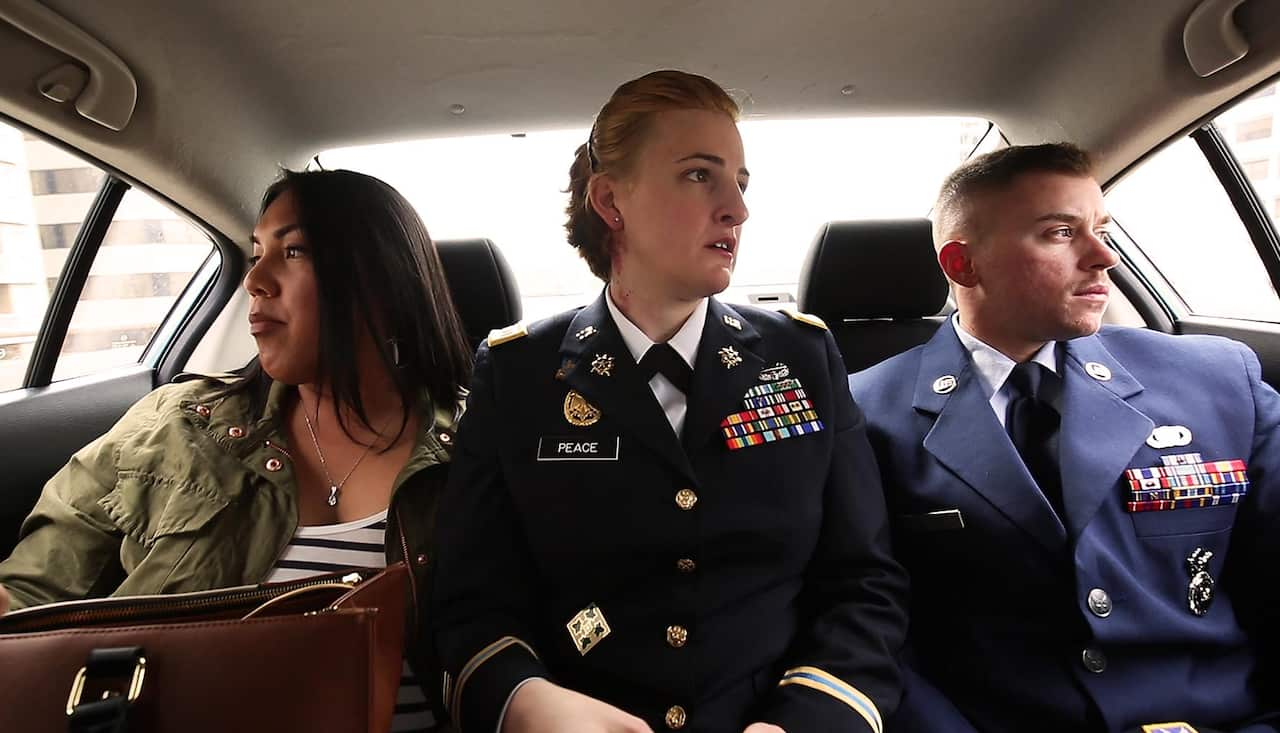Staff Sergeant Logan Ireland, Captain Jennifer Peace, Captain El Cook and Private Laila Villanueva are especially brave. Over the course of four years, they enact their activism under the constant threat of being dismissed from their jobs or being the victims of discrimination, even violence from within the military. At the time of making Transmilitary, openly transgender people were banned from serving in the US military.
Directed by Gabriel Silverman and Fiona Dawson, the documentary – winner of the 2018 SXSW Audience Award – films its subjects going about their daily lives as servicemen and women. We see the relentless struggles they face within the armed forces and get glimpses into their personal lives. They are passionate about their families and loved ones, passionate about serving their country and passionate about fighting for trans rights within the US military.
We very quickly learn that these are dedicated and competent people that any country would be fortunate to have serving in their armed forces.

‘Transmilitary’. Source: SBS
Lifting of the ban
On 30 June 2016, US Secretary of Defence Ash Carter announced that the ban on transgender men and women serving in the military had been lifted effective immediately, and decreed that discrimination based on gender identity was a form of sex discrimination.
The lifting of the ban took effect after the filming of Transmilitary, but this documentary is now even more urgent and compelling viewing given the events that have taken place since then.
Denying transgender identity
On 26 July 2017, US President Donald Trump tweeted, yes tweeted, that “the United States Government will not accept or allow transgender individuals to serve in any capacity in the U.S. Military.”
From that moment, legal battles have ensued, and in March 2019 a memorandum from the Office of the Deputy Secretary of Defence was issued ordering the US military to adopt a new policy on transgender people serving in the armed forces to take effect on 12 April 2019:
Under the new rules, troops and recruits can identify as transgender, but must use the uniforms, pronouns, and sleeping and bathroom facilities for their biological sex. They will not be allowed to serve if they have a diagnosis of gender dysphoria, a disorder in which a person’s gender identity does not match their physical gender at birth.
The policy exempts transgender troops who have already transitioned or have begun the medical process. Anyone who defies the regulations in the future would be forced out of uniform.
As for the reason for his decision, Trump cited “costs and military readiness”, but the evidence shows that countries where transpeople are allowed to serve have zero, or at most minimal costs to military budgets from these inclusive policies. Transmilitary exposes that expenditure for erectile dysfunction prescriptions in the general population of the US military is $84.24 million – as opposed to the cost of transgender healthcare which is one-tenth of this cost at $8.4 million.
Now, in 2019, here we are back with another dangerous version of the “don’t ask, don’t tell” policy that is essentially trying to erase the existence of transpeople in the US military.
But here’s the ironic twist – there are an estimated 15,500 trans men and women in active service in the US armed forces, making the military the largest employer of transgender people in the USA.
They are ready, willing and very able. So if cost is the issue, what would the cost be to replace and retrain over 15,000 new recruits?
Trans support is generally growing
There is now overwhelming public support for transgender people to have the right to serve in the US armed forces – GLAAD reports that 70% of the US population is in favour.
Every other federal department and agency in the United States allow transgender personnel, including the FBI and the CIA, which since 2009 has prohibited discrimination against transgender employees.
Nineteen countries throughout the world currently allow transpeople to serve in their military with no reports that their trans-inclusive policies undermine effectiveness. And in the two years from 2017 that transgender women and men have been allowed to openly serve in the US military there have been “precisely zero” problems, says the US Army Chief of Staff, Mark A. Milley.
Discrimination directed at any one group creates higher rates of mental health issues within that group, but state-sanctioned discrimination takes bigotry to another level and is directly linked with higher rates of suicide.
Transmilitary is essential viewing in the fight for transgender rights and visibility.
Transmilitary airs on Thursday, 6 June at 11:20pm on SBS VICELAND. Stream it anytime at SBS On Demand:
Share




